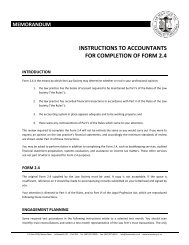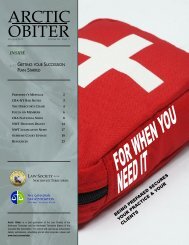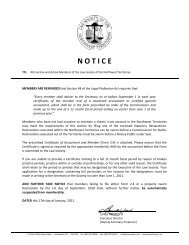ARCTIC OBITER
March/April 2013 - Law Society of the Northwest Territories
March/April 2013 - Law Society of the Northwest Territories
- No tags were found...
Create successful ePaper yourself
Turn your PDF publications into a flip-book with our unique Google optimized e-Paper software.
sentence of 14 months less 83 days<br />
in jail and one year probation for<br />
the following offences: assault,<br />
causing a disturbance, breaching<br />
an undertaking, being unlawfully<br />
in a dwelling house, resisting<br />
arrest, and breach of recognizance.<br />
The assault involved the offender<br />
spitting on his niece and another<br />
woman who intervened in an<br />
argument between the offender<br />
and his spouse. The 33-year-old<br />
offender had a lengthy, related<br />
criminal record. The Crown<br />
submissions suggested a global 10-<br />
month sentence that included three<br />
months for the assault. Defence<br />
counsel did not take issue with<br />
three months for the assault but<br />
suggested an eight-month global<br />
sentence. The sentencing judge<br />
imposed a sentence that included<br />
six months’ jail plus a year of<br />
probation for the assault.<br />
Appeal dismissed – The sentencing<br />
judge erred by not fulfilling his<br />
duty to alert counsel to his<br />
concerns about the range of<br />
sentence proposed, to advise them<br />
that he was inclined to sentence<br />
outside that range, and to give<br />
them an opportunity to make<br />
additional submissions. Just<br />
because the trial judge chose to<br />
give the guilty plea little weight<br />
does not mean he failed to take it<br />
into account. Six months is the<br />
maximum sentence on a summary<br />
conviction assault.<br />
However the<br />
“worst offender, worst offence”<br />
principle no longer operates as a<br />
constraint on a maximum sentence<br />
being imposed. In this case, the six<br />
-month sentence was not outside<br />
the usual range for spitting<br />
offences. The six-month sentence<br />
should not be considered in<br />
isolation from the global sentence<br />
or from the other offences for<br />
which the appellant was sentenced<br />
at the same time.<br />
The global<br />
sentence was not unfit in the<br />
circumstances.<br />
~<br />
LANDLORD/TENANT LAW –<br />
STANDARD OF REVIEW<br />
Jeske v Yellowknife Housing<br />
Authority<br />
2013 NWTSC 17 (March 25, 2013)<br />
Presiding: Justice L.A. Charbonneau<br />
For the Appellant: N. Smith (w/ leave of the Court)<br />
For the Respondent: E. Gulberg<br />
The respondent sought and<br />
obtained from the Rental Officer a<br />
termination of the tenant’s lease<br />
and an eviction order on the basis<br />
of the tenant’s failure to pay her<br />
electricity bill. The tenant<br />
appealed.<br />
The purpose of the Residential<br />
Tenancies Act is to provide an<br />
a c c e s s i b l e , i n f o r m a l a n d<br />
expeditious process to deal with<br />
disputes between landlords and<br />
tenants.<br />
The applicable standard<br />
of review, where the Rental Officer<br />
acts within the scope of his<br />
jurisdiction, is reasonableness. The<br />
Rental Officer viewed the tenant’s<br />
failure to pay her electricity bill as<br />
a serious breach and explained<br />
why. His conclusion was not<br />
unreasonable. The question on<br />
appeal is not whether the Renal<br />
Office could have made another<br />
decision, or whether the court<br />
would have made a different<br />
decision. Given the standard of<br />
review, the court is unable to grant<br />
the relief sought by the appellant.<br />
~<br />
FAMILY LAW – INTERIM<br />
SPOUSAL SUPPORT -<br />
QUANTUM<br />
Michelin v McLean<br />
2013 NWTSC 18 (March 27, 2013)<br />
Presiding: Justice V.A. Schuler<br />
For the Applicant: J. Walsh<br />
For the Respondent: K. Allison<br />
The parties were in a common-law<br />
relationship from 1986 to 2012.<br />
The respondent did not dispute the<br />
applicant’s entitlement to interim<br />
support. The only issue was<br />
quantum. The respondent had an<br />
annual income of $80,000. The<br />
court considered the applicant to<br />
have no income, as she was<br />
receiving social assistance which<br />
would be reduced by any spousal<br />
support.<br />
$2,400/month spousal support<br />
24 ■ MARCH/APRIL 2013 <strong>ARCTIC</strong> <strong>OBITER</strong>
















